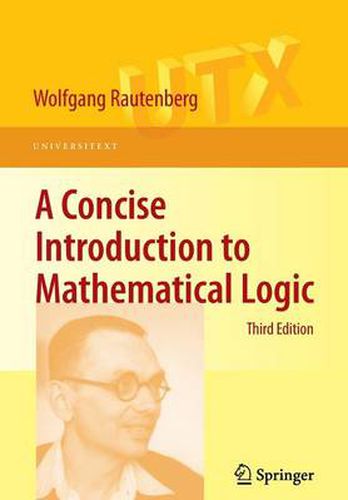Readings Newsletter
Become a Readings Member to make your shopping experience even easier.
Sign in or sign up for free!
You’re not far away from qualifying for FREE standard shipping within Australia
You’ve qualified for FREE standard shipping within Australia
The cart is loading…






This title is printed to order. This book may have been self-published. If so, we cannot guarantee the quality of the content. In the main most books will have gone through the editing process however some may not. We therefore suggest that you be aware of this before ordering this book. If in doubt check either the author or publisher’s details as we are unable to accept any returns unless they are faulty. Please contact us if you have any questions.
by Lev Beklemishev, Moscow The ?eld of mathematical logic-evolving around the notions of logical validity, provability, and computation-was created in the ?rst half of the previous century by a cohort of brilliant mathematicians and philosophers such as Frege, Hilbert, Godel, Turing, Tarski, Malcev, Gentzen, and some others. The development of this discipline is arguably among the highest achievements of science in the twentieth century: it expanded mat- matics into a novel area of applications, subjected logical reasoning and computability to rigorous analysis, and eventually led to the creation of computers. The textbook by Professor Wolfgang Rautenberg is a well-written - troduction to this beautiful and coherent subject. It contains classical material such as logical calculi, beginnings of model theory, and Godel’s incompleteness theorems, as well as some topics motivated by appli- tions, such as a chapter on logic programming. The author has taken great care to make the exposition readable and concise; each section is accompanied by a good selection of exercises. A special word of praise is due for the author’s presentation of Godel’s second incompleteness theorem, in which the author has succeeded in giving an accurate and simple proof of the derivability conditions and the provable ? -completeness, a technically di?cult point that is usually 1 omittedintextbooksofcomparablelevel. Thisworkcanberecommended to all students who want to learn the foundations of mathematical logic.
$9.00 standard shipping within Australia
FREE standard shipping within Australia for orders over $100.00
Express & International shipping calculated at checkout
This title is printed to order. This book may have been self-published. If so, we cannot guarantee the quality of the content. In the main most books will have gone through the editing process however some may not. We therefore suggest that you be aware of this before ordering this book. If in doubt check either the author or publisher’s details as we are unable to accept any returns unless they are faulty. Please contact us if you have any questions.
by Lev Beklemishev, Moscow The ?eld of mathematical logic-evolving around the notions of logical validity, provability, and computation-was created in the ?rst half of the previous century by a cohort of brilliant mathematicians and philosophers such as Frege, Hilbert, Godel, Turing, Tarski, Malcev, Gentzen, and some others. The development of this discipline is arguably among the highest achievements of science in the twentieth century: it expanded mat- matics into a novel area of applications, subjected logical reasoning and computability to rigorous analysis, and eventually led to the creation of computers. The textbook by Professor Wolfgang Rautenberg is a well-written - troduction to this beautiful and coherent subject. It contains classical material such as logical calculi, beginnings of model theory, and Godel’s incompleteness theorems, as well as some topics motivated by appli- tions, such as a chapter on logic programming. The author has taken great care to make the exposition readable and concise; each section is accompanied by a good selection of exercises. A special word of praise is due for the author’s presentation of Godel’s second incompleteness theorem, in which the author has succeeded in giving an accurate and simple proof of the derivability conditions and the provable ? -completeness, a technically di?cult point that is usually 1 omittedintextbooksofcomparablelevel. Thisworkcanberecommended to all students who want to learn the foundations of mathematical logic.